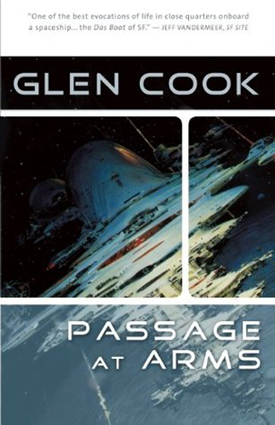 This edition of Glen Cook’s Passage at Arms is a reissue of one of his early science-fiction novels, first published in 1985. Those who know Cook from The Black Company or Garrett P.I. may be surprised to learn that he has also written some first-rate military sf.
This edition of Glen Cook’s Passage at Arms is a reissue of one of his early science-fiction novels, first published in 1985. Those who know Cook from The Black Company or Garrett P.I. may be surprised to learn that he has also written some first-rate military sf.
Although set in the same universe as Cook’s Starfishers Trilogy, Passage at Arms is in all respects a stand-alone. It is simply the story of a tour of duty on a Climber, a ship capable of ascending beyond hyperspace and popping out to wreak havoc on an unsuspecting enemy — except the enemy is seldom all that unsuspecting. The war is between Humanity and the Ulant, and the Ulant seem to have the advantage in materiel and numbers, but Humanity has the Climbers. This particular crew and this particular Climber play a key role in one of the critical points of the war.
It doesn’t seem to matter that I’ve been reading Glen Cook almost since he started publishing — I come away from his books, whether first encounters with new ones or visits with old friends, with new insights into his work. In this case, I first read Passage at Arms many years ago, and this time through I was struck by a new thought, something that, looking back, seems to apply in some measure to almost everything I’ve read by him: Cook examines people under pressure. (He says he doesn’t “examine,” but he does.) It may be the kind of pressure we see in Passage at Arms, of men in close quarters fighting for their lives when most of the fighting is lying low in increasingly difficult circumstances. Jeff VanderMeer called Passage at Arms “the Das Boot of sf,” and I think that comes close: the book has that kind of tension, that kind of suffocating quality. Sometimes, as in The Black Company, the pressure is largely self-generated. And sometimes, as in The Instrumentalities of Night, it is simply a function of the time.
Cook insists that he’s just telling stories (and I am the last person to argue: whether artists consciously put in everything an audience finds in their work is an open question with me), but they are stories told seamlessly, with every aspect of the book adding its bit to something that is greater than the sum of the parts. It’s not surprising to find this happening in his more recent works — he’s been writing for a long time — but going back to something that is fairly early and finding the same characteristics, the same strong focus and the same unity, makes one think again about the ability of the storyteller.
Take, for example, Cook’s style. Yes, he does have a basic style, concise, concrete, founded in simple declarative sentences, but certainly not averse to more complex constructions. This leads to another insight, not from reading this book, but applicable here: Cook alters his style to fit character, whether it be the character of the protagonist/narrator (and many of his books are written in the first person) or of the milieu. The style in Passage at Arms is fluent and flexible: when the narrator, a journalist who has wangled his way onto a Climber, complete with an old rank that he left behind some time ago, is first getting his bearings, we’re reading “normal” prose that even sometimes edges into “colorful.” As conditions move closer and closer to completely intolerable and tension mounts, the style gets tighter, sharper. The edge-of-the-seat factor increases exponentially. (I’m going to permit myself a small bit of polemic here: I’ve read comments by some reviewers who were apparently first experiencing Cook from the early Black Company novels or The Instrumentalities of the Night about his “grammar.” One even had the cheek opine that if Cook could get over his “grammatical errors,” the book would be much better. My reaction is that anyone who can say that about a writer of Cook’s stature and experience obviously needs to start over again with Tom Swift and Heinlein juveniles and work their way into literature for adults. Anyone who doesn’t think Cook knows exactly what he’s doing obviously just doesn’t get it.)
As I noted, this is a reissue by Night Shade, and for anyone who has any interest in military sf or examinations of men under stress, it’s a must.
(Night Shade Books, 2009 [orig.1985])
